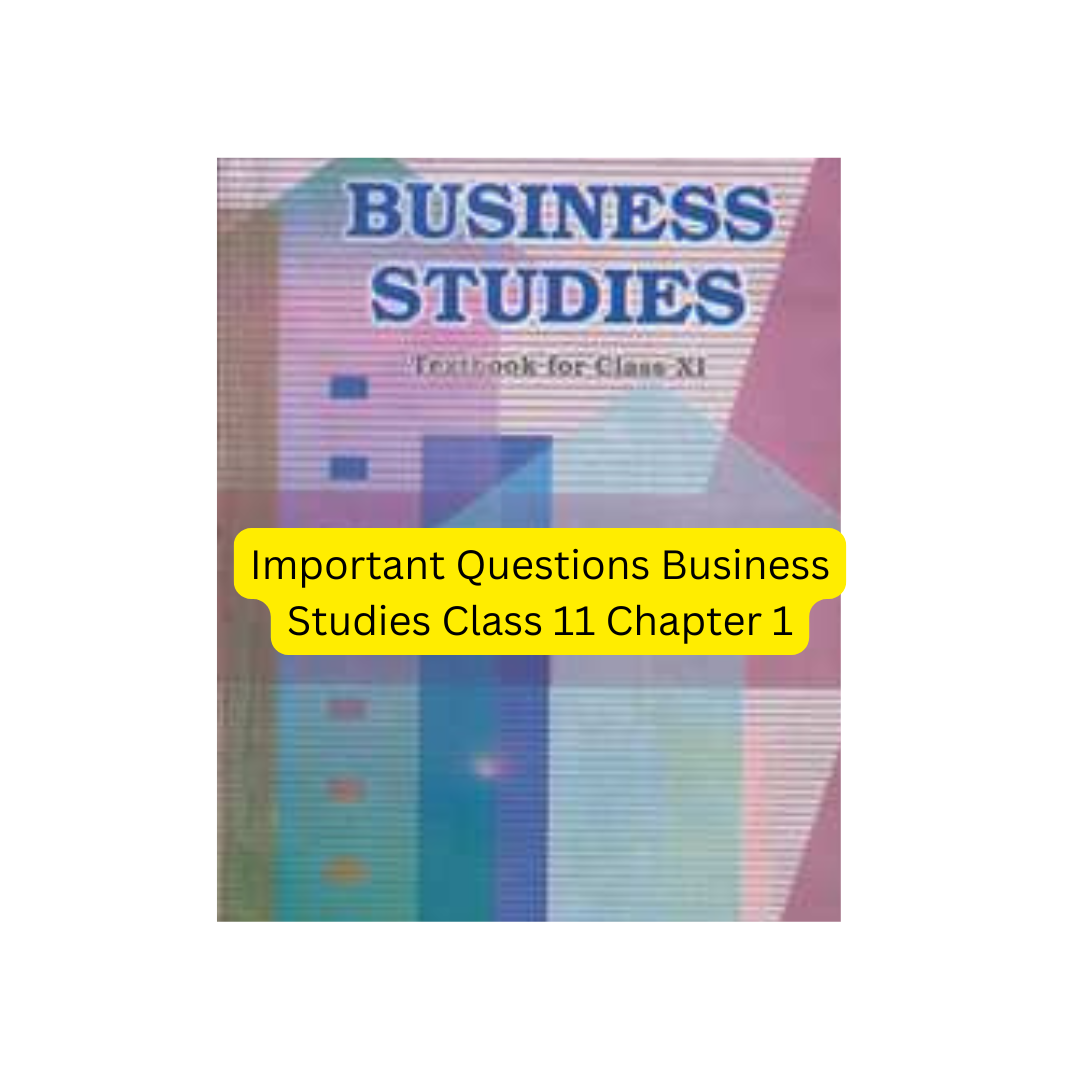Important Questions Business Studies Class 11 Chapter 1. Enhance your understanding of Business Studies with these essential questions and answers. Perfect for exam preparation, Business Studies Questions and Answers for Exam Preparation
Important Questions Business Studies Class 11 Chapter 1, class 11 bst ch 1 important questions and answers, class 11 bst important questions pdf ch 1, business studies class 11 important questions ch 1

Important Questions Business Studies Class 11 Chapter 1
15 important questions business studies class 11 chapter 1
Q1: What are the different types of economic activities?
Answer: Economic activities are broadly classified into three types:
- Profession: Involves specialized knowledge and expertise.
- Business: Includes activities related to the production or sale of goods and services.
- Employment: Where individuals work for others and receive wages or salaries.
Q2: Name one economic pursuit that requires expertise.
Answer: A profession is an economic pursuit that demands specialized knowledge and skills.
Q3: Which industries provide support to other industries?
Answer: Tertiary industries support primary and secondary industries by offering services like transportation, communication, and banking.
Q4: Can fishing be considered a primary industry?
Answer: Yes, fishing is a primary industry as it involves extracting natural resources directly from nature.
Q5: Categorize the occupation where employees work for others and get paid.
- Profession
- Business
- Employment
- None of the above
Answer: Employment.
Q6: Sort the following into business, employment, and profession:
- Farmer: Business
- Clerk: Employment
- Lawyer: Profession
- Doctor: Profession
Q7: What is the reward for bearing risks in business?
Answer: Profit is the reward a businessman earns for taking risks.
Q8: What is the difference between Business and Profession?
| Business | Profession |
|---|---|
| Requires capital based on the size and nature. | Limited capital needed for establishment. |
| Profit is uncertain. | Risk is relatively low. |
Q9: Mention the risks involved in business.
Answer: Business risks include:
- Uncertainty and unexpected situations.
- Risks are an essential part of business.
- Profit is the reward for managing risks.
Q10: What are the objectives of a business?
Answer: Objectives include:
- Innovation: Introducing new ideas and inventions to sustain growth.
- Productivity: Achieving higher output compared to input.
- Earning Profit: Ensuring financial stability and growth.
Q11: Define Commerce and its significance in modern life.
Answer: Commerce is the exchange of goods, services, or value among businesses or entities. Its significance includes:
- Acts as a bridge between manufacturers and consumers.
- Creates employment opportunities.
- Promotes global trade.
- Supports industrial growth.
- Provides assistance during natural calamities.
Q12: Under which type of industry are oil refineries and sugar mills classified?
Answer: Oil refineries and sugar mills fall under the secondary industry.
Q13: What are the differences between primary and secondary industries?
| Primary Industry | Secondary Industry |
| Involves extraction of natural resources. | Converts raw materials into finished goods. |
| Examples: Mining, fishing. | Examples: Oil refinery, sugar mills. |
Q14: How do traders overcome hindrances in business?
Answer:
- Hindrance of Person: Eliminated by enabling manufacturers to sell directly to consumers.
- Hindrance of Place: Resolved through transportation of goods to marketplaces.
- Hindrance of Risk: Managed via insurance to cover losses due to theft, fire, or accidents.
- Hindrance of Information: Removed by advertising to inform consumers about products and services.
Q15: Why is Insurance considered a tertiary industry?
Answer: Insurance provides support services to both primary and secondary industries by covering risks and ensuring financial security. It is part of the service sector, which includes schools, ban
business studies class 11 important questions ch 1
you can download pdf from here
What are the Types of Economic Activities?
Economic activities are broadly classified into:
- Profession
- Business
- Employment
Expertise in Economic Pursuits
Question: Which economic pursuit requires expertise?
Answer: Profession requires specialized knowledge and expertise to perform specific tasks.
Industries That Support Fellow Industries
Question: What type of industries provide support to other industries?
Answer: Tertiary industries provide essential services like transport, insurance, and banking to support primary and secondary industries.
Fishing as a Primary Industry
Question: Can fishing be classified as a primary industry?
Answer: Yes, fishing is considered a part of the primary industry as it involves extracting natural resources directly from the environment.
Employment: A Key Economic Activity
Question: Which occupation involves working for others and earning a salary?
Answer: Employment involves working under someone and receiving wages or salaries.
Classify Occupations into Economic Categories
Question: Categorize the following:
- Farmer
- Clerk
- Lawyer
- Doctor
Answer:
- Farmer: Business
- Clerk: Employment
- Lawyer: Profession
- Doctor: Profession
Rewards for Bearing Business Risks
Question: What is the reward for taking risks in business?
Answer: A businessman earns profit as a reward for bearing risks.
Business vs. Profession
| Aspect | Business | Profession |
|---|---|---|
| Capital Investment | Requires capital based on size. | Requires limited capital. |
| Risk Factor | High risk with uncertain profits. | Relatively low risk. |
Risks in Business
Business risks arise due to:
- Uncertainty and unexpected situations.
- External factors like market trends or natural disasters.
- Profit serves as a reward for managing these risks.
Objectives of Business
- Innovation: Encourages creative ideas for survival and growth.
- Productivity: Measures efficiency by comparing input and output.
- Profitability: Essential for sustainability and growth.
Commerce and Its Modern Significance
Question: What is Commerce, and why is it significant today?
Answer:
Commerce involves the exchange of goods, services, or value among economic entities.
Significance:
- Bridges the gap between producers and consumers.
- Provides employment opportunities.
- Promotes global trade and industrial growth.
- Assists during emergencies like floods or droughts.
Classification of Oil Refineries and Sugar Mills
Question: Under which type of industry do oil refineries and sugar mills fall?
Answer: They are part of the secondary industry, which processes raw materials into finished goods.
Primary vs. Secondary Industry
| Aspect | Primary Industry | Secondary Industry |
|---|---|---|
| Focus | Extraction of natural resources. | Processing raw materials. |
| Examples | Fishing, mining. | Oil refinery, sugar mills. |
How Traders Overcome Barriers
Traders address challenges like:
- Person Hindrance: By acting as a link between manufacturers and consumers.
- Location Hindrance: Using transportation to deliver goods.
- Risk Hindrance: Through insurance coverage.
- Information Hindrance: Via advertising to inform consumers.
Insurance as a Tertiary Industry
Question: Why is insurance categorized under the tertiary industry?
Answer:
Insurance is a service industry that supports both primary and secondary industries by mitigating risks such as loss or damage to goods.
That’s all for Important Questions Business Studies Class 11 Chapter 1, class 11 bst ch 1 important questions and answers, class 11 bst important questions pdf ch 1, business studies class 11 important questions ch 1, Business Studies Questions and Answers for Exam Preparation, cbse class 11 business studies chapter 1 important questions
You can follow us on Instagram: https://www.instagram.com/stationvidya/
Facebook: https://www.facebook.com/stationvidya/
You tube: https://www.youtube.com/@stationvidya/
We hope you’d loved the content , please do like, share and comment.
Subscribe for notification

Leave a Reply